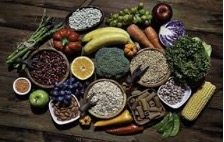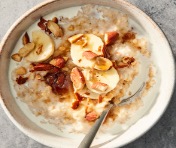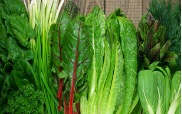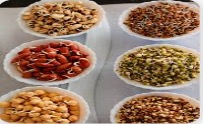Contribute
| Know Best Foods For Heart Health |
Dr. Indrajeet Tyagi and Dr. Iranna Hirapur
05/22/2024
by Dr. Indrajeet Tyagi and Dr. Iranna Hirapur
Eating a heart-healthy diet is one of the best ways along with exercise to help reduce the risk of heart disease and promote heart health. There are many healthy and tasty foods that can be easily go into your diet. But, we have singled out some healthy foods that can help reduce your risk of cardiovascular disease, and highlighted a few ways you can easily incorporate them into your daily diet for a healthier heart.
High antioxidants foods --Using such foods help remove free radicals from the body, which can run rampant and actually damage cells, causing serious illness. Many health professionals use them for treatments of heart diseases, stroke, and neurodegenerative diseases, such as Alzheimer's and Parkinson's. They are helpful in treating brain injury and may slow and even prevent development of cancers.
| Cranberries, red/purple grapes, peaches, raspberries, strawberries, red currants, figs, cherries, pears, guava, oranges, apricots, mango, red grapes, cantaloupe, watermelon, papaya, and tomatoes are high in antioxidants, packed with vitamins, and beneficial in numerous ways. |
High fiber foods -- A diet rich in fiber, particularly from whole-grain foods, could prevent heart disease risk. Up to age 50, men should eat 38 grams of fiber per day. After age 50, they should aim for 30 grams daily. The corresponding amounts for women are 25 and 21 grams. Fiber help to prevent heart disease by lower both blood pressure, cholesterol levels, and lose weight.
| Fiber is a carbohydrate that your body cannot break down, so it passes through the body undigested. Insoluble fiber is found in whole grains, wheat cereals, and vegetables such as carrots, celery, and tomatoes. Soluble fiber sources include barley, oatmeal, beans, nuts, and fruits such as apples, berries, citrus fruits, and pears. Use grains and beans without removing their skins. |
Salads – include vegetables, beans, legumes, whole grains, nuts and seeds that are loaded with fiber. "Fiber is beneficial for controlling diabetes and heart disease and contribute to bodily functions like bowel regularity and satiety levels,
| Salads made with cucumber, carrots, radish, cabbage, cauliflower, leafy green vegetables like chard, kale, spinach, romaine lettuce, and bok choy are packed with vitamins and minerals and are low in calories. Add some beans since they are a good source of disease-fighting antioxidants, protein, fiber, as well as energy-boosting iron. Avocado adds creaminess and fiber and its fats help your body take in nutrients, including heart-healthy lycopene. |
Fruits/fresh Juices – Good health begins with a healthy gut, varying your fruit intake is a great strategy. Include fruits and vegetables in your diet and recommended to have 1 ½ to 2 cups of fruit daily.
| Oranges, berries, apples, papaya, kiwi, prune, cherries, watermelon, dates, avocados, and bananas are an excellent source of essential vitamins, minerals, fiber and a wide range of health-boosting antioxidants, including flavonoids. Other protective substances guard against chronic diseases, from heart disease to cancer to mood disorders like depression and anxiety. |
Oats- contain a type of soluble fiber, called beta glucan, which lowers blood glucose and cholesterol levels, thus reducing risk of heart disease, weight loss, and diabetes. Oats promotes fullness, Beta glucan also promotes healthy gut bacteria, intestinal health and reduce risk of heart disease. It is also a source of vitamins B and E, and minerals such as magnesium.
| Oatmeal contains many vitamins and minerals. A one-cup serving of cooked oatmeal has about 1.8 milligrams of vitamin B1, or thiamin. That is close to 15% of what an adult needs each day. It also has 1.36 mg of manganese, which is 59% of the daily recommendation for men and 76% for women. Manganese has roles in immunity; blood clotting and the way cholesterol and blood sugar are metabolized. |
Green leafy vegetables- are packed with vitamins, antioxidants, and minerals and are low in calories. They are a great source of vitamin K, which helps protect your arteries and promote proper blood clotting. Use high-fiber greens in your diet by tossing a handful into your soups, add as a side salad to your lunch or sauté for a side dish.
| Adding energy-dense greens to your diet can nourish your heart by targeting important risk factors for cardiovascular disease like cholesterol, blood pressure, inflammation, and even mortality. Just a cup of raw vegetables a day is the right amount for the maximum health benefit. |
Sprouts- Adding sprouts to your diet also have benefits for the health of your heart. Several studies have shown that consuming sprouts can lower cholesterol levels in people with diabetes or obesity and increase in “good” HDL cholesterol as well as a drop in triglycerides and “bad” LDL cholesterol.
| Sprouting does not change the nutrition profile of the plant, but rather helps better release beneficial compounds that help improve digestion of both carbohydrates and proteins. Germination stimulates the release of enzymes to pre-digest starch, which may aid in gut health and reduce intestinal gas. |
Whole grains --Three daily servings of whole grains like oats, wheat, Jawar, Bajra, Ragi, millets, brown rice, wild rice, quinoa, and cuscus can keep your heart healthy and your cholesterol managed.
| They contain a wide range of nutrients including fiber, vitamins, minerals and antioxidants, which are good for our hearts. Grains should be consumed alongside plenty of vegetables and fruits. Do not remove bran from the grains or the flour. |
Low fat milk-- The Heart Foundation recommends reduced-fat milk, yoghurt and cheese for people with heart disease or high cholesterol because the fat in dairy products can raise cholesterol levels.
| Fat-free and 1% fat milk provide slightly more nutrients than whole milk and 2% fat milk and are much lower in fat, saturated fat, cholesterol and calories. For adults: two to three servings of fat-free or low-fat dairy products daily. For children, two to two and a half servings a day. For teenagers and older adults, three servings each day. |
Arjun Chaal or Green tea-- The phytochemicals in Arjun Chaal can help lower blood pressure, reduce cholesterol levels, and improve overall heart health. Green tea could lower many risk factors of heart disease, such as blood pressure or lipids.
| Arjun Chaal strengthens and tones the heart muscles and helps in proper functioning of the heart. It also has anti-hypertensive property and helps reduce high blood pressure. |
You may also access this article through our web-site http://www.lokvani.com/


















